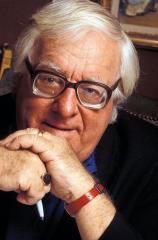Ray Bradbury
Biography
Ray Bradbury
One of the most celebrated writers of our time, Ray Bradbury inspired generations of readers to dream, think and create. He wrote for magazines, the theater, cinema and TV, creating hundreds of short stories and more than three dozen books, as well as numerous poems, essays, operas, plays, screenplays and teleplays. His groundbreaking works include FAHRENHEIT 451, THE MARTIAN CHRONICLES, THE ILLUSTRATED MAN, DANDELION WINE and SOMETHING WICKED THIS WAY COMES. Among his many honors, Bradbury was the recipient of the National Book Foundation Medal for Distinguished Contribution to American Letters, the National Medal of Arts, an Emmy Award, and a Pulitzer Prize Special Citation.
Ray Bradbury


















